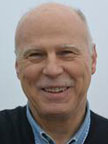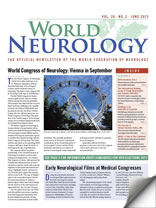I want to apply for the position of secretary-treasurer general for the upcoming election at the WCN 2013 in Vienna.
I have been a member of the WFN Education Committee for more than 10 years, have chaired this committee and am now co-chairing. I am chair of the Teaching Course Committee. Since Bangkok 2009, I am an elected trustee of the WFN, and was re-elected in 2012 for a second term.
I was responsible for organizing the educational program in Marrakech, and currently for the WCN 2013, where I am also the congress secretary. Being an active part in the new organizational tasks, which have been introduced into the WFN in the past years, I have experience and structural knowledge of the WFN’s organization, which is necessary for this important position.
The World Federation of Neurology is comprised of 114 international member societies in 113 countries that aim “to foster quality neurology and brain health around the world.” This mission is ultimately intended to improve the outcome of patients with neurological disease.
The WFN has undertaken many opportunities to promote its mission internationally through its world congresses, which are carried out biannually in joint cooperation with regional societies.
It has regional initiatives in Africa, Asia and South America, collaborates with global institutions, such as the WHO, and sponsors several projects, including grants, exchange programs, a website and educational activities structured as exchange programs, teaching centers and also teaching courses jointly with the EFNS. The WFN has an official journal, The Journal of the Neurological Sciences and a regular magazine, World Neurology, that is available online and will be vital for the future activities of the WFN. A successful cooperation with the AAN making Continuum available in low income countries is a permanent educational success.
This profusion of activities and offices has had an impact on the WFN’s organizational and financial structures, and it will fall to the secretary-treasurer general to provide the platform for improving the efficiency of both.
Application Scheme
The position of the secretary-treasurer general is an important position of trust situated between the president and the elected trustees, the secretariat and its 114 member societies.
The role of the secretary-treasurer general should, on one hand, involve collaboration with the president and trustees in promoting and resolving important issues, offer suggestions and solutions and improve an develop administrative tasks, and on the other hand, develop a service-oriented communication with our members in order to improve the needs of this global society.
International organizations such as the WFN need a strong organizational structure to support and service the efforts of the organization. The present organizational structure has been overwhelmed by the increasing range of WFN activities and needs to be adapted. The organization is a U.K. charity and will need to internationalize to meet the growing support needs of its officers and committees.
This cannot only be achieved by an increase of human ressources, but also the increased implementation of further “virtual offices,” such as the adoption of Google technology, which is just the beginning. The continuing aim should be to implement an organization structure capable of meeting the many needs of the WFN while increasingly exploiting modern media.
No society can work without adequate funding, and previous management decisions have prudently positioned the WFN with adequate funds to endure one or two years without income, which could result from the cancellation of a congress or a major financial crisis. The sources of finances for the WFN include not only membership dues but also income from congresses and publications. Additional sources of revenue are more difficult to realize, especially as worldwide support from industry has significantly diminished. This is a loss on one hand and an opportunity on the other to seek new means of fundraising. Over time, the WFN has experienced increased operating expenses, in particular through its worldwide initiatives, grants and spending on member activities that help to realize its main goals as a global scientific society.
The future aim will be to keep the WFN on a sound financial background, but encourage spending on future projects and also co-sponsorship with other institutions or scientific or national societies. This will need a regular budget update, which should inform on the current financial activities as well as enable budget planning in larger dimensions.
The WFN’s bylaws and organizational guidelines have served it well over its history, but no longer seem to fulfill its present-day needs. For example, the continued change in leadership throughout the organization can result in a loss of continuity. By contrast, many societies elect their presidents one year earlier than the elected term, keeping the past president in place for some time in order to exploit that person’s knowledge and achievements during the turnover of command. This model might be a solution for key WFN committees, where the current rapid transition can be disruptive and are not acceptable in a society of the duties and dimensions as the WFN.
The same refers to the portfolios of the elected trustees of the WFN, which need to be defined in more detail in regard to duties and responsibilities. In the context of a large organization, this will help to use resources more effectively.
In summary, my goals as secretary-treasurer general for the WFN will be the
• adaptation and improvement of the society’s organization,
• transparency and communication, and
• a sound financial concept.
Due to the insights and impression I have gathered both as a member as well as a trustee of the WFN, I am convinced that I can fulfill this function to the satisfaction of the WFN and its members.
